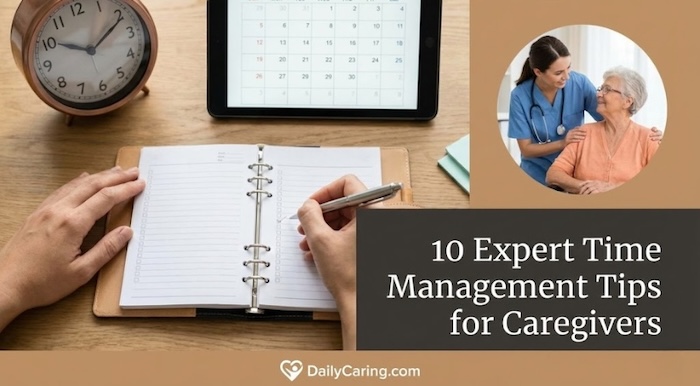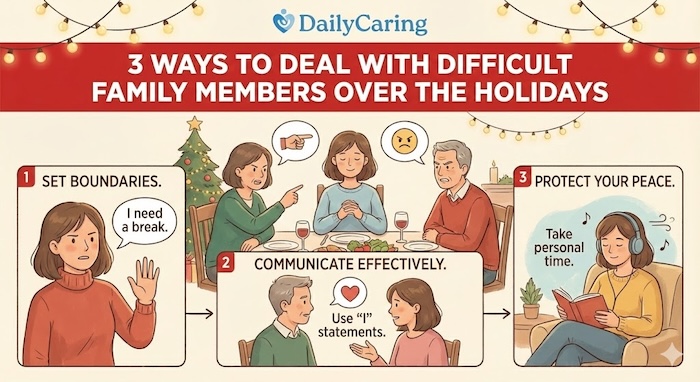For caregivers, time is one of the most precious yet elusive resources, often slipping away in a blur of urgent tasks, emotional demands, and personal sacrifices. The constant juggling act between caregiving responsibilities, personal obligations, and self-care can leave even the most organized individuals feeling overwhelmed and depleted.

This article distills the wisdom of a true expert into 10 practical time-management tips tailored to the unique challenges of caregiving. By implementing these actionable strategies, you can regain control, create space for what truly matters, and build a more sustainable, balanced caregiving routine that honors both your loved one's needs and your own well-being.
Managing Time is an Essential Caregiving Skill
Time is precious when you’re caring for an older adult. There’s so much to do, both for them and for you, and only 24 hours in a day.
Amy Goyer, AARP’s family caregiving expert, has plenty of experience getting more done with less stress. She’s learned essential time-management skills through real-world experience.
Amy has spent more than 35 years juggling work and caring for her grandparents, parents, sister, and other relatives and friends.
She has written extensively for AARP about her experiences caring for her mother, who died in 2013, and her father, who lived with Alzheimer's disease for 12 years before he died in 2018.
In this AARP article, Amy shares her 10 best time-management tips for caregivers. We highlight the key points from her article and provide our perspective.
10 Expert Time Management Tips for Caregivers
1. Schedule “me” time first
There’s so much to do for your older adult that “me” time usually falls to the bottom of your to-do list.
But we can’t be effective caregivers if we’ve got nothing left to give. A car with no gas in the tank cannot keep going, and neither can we.
To be able to care for others, we have to care for ourselves first – it’s not selfish, it’s practical.
The key is to schedule time for yourself first; don’t expect it to just happen.
Hire some help, ask a family member or friend, or get respite care so you can take time away to recharge.
2. Plan ahead
Planning saves time and reduces stress in the long run.
For example, a few minutes spent reviewing upcoming doctor appointments ensures you or someone else is confirmed to accompany your mother. This means avoiding last-minute scrambles and scheduling work, errands, or “me” time.
Or regularly check medications and essential supplies so you can restock before running out.
That will mean fewer desperate runs to the store on busy days and fewer missed doses due to a prescription not being ready.
3. Define roles and responsibilities
Working with others to care for your older adult provides critical support, but it’s essential to ensure everyone is clear on their responsibilities to avoid misunderstandings.
Tasks fall through the cracks when each person assumes the other will handle them.
Then time is wasted scrambling to get it done, schedules have to be rearranged, and tempers flare.
4. Make a list and prioritize it – repeatedly
Caregiving responsibilities might leave you feeling overwhelmed. This can make it hard to stay focused. It can also make it unclear what really needs to get done.
Having one list of To Do items keeps you organized by showing all tasks in one place and makes it easier to prioritize.
Amy suggests focusing on 3 top priorities per day. Experiment to find an organization system that works best for you, like keeping one main list and another “today’s priorities” list. Or, use a notes app that syncs with your smartphone, computer, and tablet for easy access.
When you need a boost of encouragement, focus on completing a few small tasks to give yourself a sense of accomplishment.
5. Don't procrastinate
Putting things off only makes them more complex. Please resist the temptation to procrastinate and get it done.
6. Manage expectations
It’s important to manage your own expectations of what you can realistically achieve. As your caregiving responsibilities grow, you can’t expect yourself to get everything done and do it “perfectly.”
That may mean scaling back on how often the carpet gets vacuumed, simplifying meals, or letting the yard go.
As Amy says, “Sometimes good enough really is good enough.”
7. Be mindful
When your mind is jumping around between what you’re doing now and everything else that needs to be done next, you’re less effective and more stressed.
Avoid this kind of multitasking by staying focused on whatever you’re doing at that time. Once you’re done, move on to the next thing.
So if you’re with your older adult, be present with them. If you’re working, do your work. If you’re relaxing, focus on yourself. You’ll feel better and get more done.
8. Touch it once
Amy has made a habit of handling small tasks immediately rather than adding them to her To Do list. It’s faster and keeps the list from getting out of hand.
For example, when a medical visit receipt arrives, file, scan, or shred it immediately.
Similarly, please take a couple of minutes to put away clothes, caregiving supplies, or household items immediately rather than letting them pile up.
9. Declutter and get organized
A cluttered environment causes stress and makes it hard to keep on top of things. It takes extra time to find items that aren’t stored where they should be.
One option is to follow Amy's example and consult a professional organizer to create a plan she put into action.
An alternative is to work slowly and steadily to clear the house, section by section, and use the “touch it once” rule to avoid adding to the overall clutter as you eliminate.
10. Expect detours
Plans have a way of going awry, and crises will happen.
If you take the perspective that this is inevitable, you’ll know that it isn’t your fault when these detours come up – you didn’t fail.
Using your time-management skills will help you get back on track faster.
Next Steps: Get Amy’s top 10 personal time management tips for caregivers at AARP
Final Thoughts on Time Management Tips for Caregivers
Adopting these expert time-management strategies is not about striving for perfection, but about creating a more intentional, manageable flow in your days. By planning proactively, leveraging tools, and learning to delegate, you can transform the relentless pace of caregiving into a more structured and less chaotic experience.
Keep in mind, effective time management is ultimately an act of self-compassion. It helps you preserve your energy, reduce burnout, and deliver higher-quality care. Start by integrating one or two of these tips that resonate most with your situation, and gradually build a system that works for you.
Your time is invaluable; investing in these skills empowers you to use it wisely, ensuring you can continue to provide loving care without losing yourself in the process.
Recommended for you:
- When They Say No: 8 Ways to Introduce In-Home Care for Seniors
- A Caregiver Notebook Makes Caregiving Easier
- Caregiver Guilt: Two Common Myths Increase Stress
About the Author
I am an author, speaker and consultant specializing in aging and families, including caregiving, grandparenting and multi-generational issues. I have authored numerous publications, including the books, AARP’s Juggling Work and Caregiving and Things to Do Now That You’re…a Grandparent. I am a recognized media authority, and I’ve been interviewed for TV, online and print media outlets including ABC, NBC, CBS, NPR, The Doctors, The New York Times, The Washington Post, People Magazine and numerous state and local newspapers and television stations.
I have been an advocate for older adults, children and families for more than 30 years at the local, state, national and international levels. I started my career as a music therapist and adult day services administrator, and later worked at the Ohio Department of Aging before joining AARP, where for 15 years I led the intergenerational and grandparenting programs including the Grandparent Information Center, a leading resource for grandparent caregivers.













